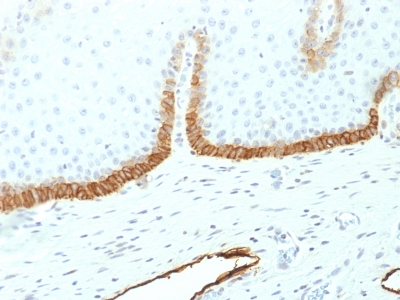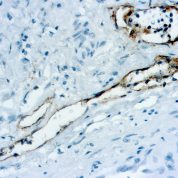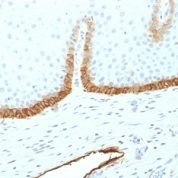Human Anti-Podoplanin Antibody Product Attributes
Species: Human
Tested Applications: Immunohistochemistry (IHC).
Clonality: Monoclonal
Anti-Podoplanin Antibody Clone: PDPN/1433
Clone PDPN/1433 Host and Isotype: Mouse IgG1 kappa
Anti-Human Podoplanin Positive Control Sample: HeLa Cells. Angiosarcoma or Mesothelioma.
Cellular Localization of Antibody <PDPN/1433 Staining: Cell Surface and Cytoplasmic
Buffer and Stabilizer: 10mM PBS with 0.05% BSA and 0.05% Azide
Antibody Concentration: 200 ug/ml
Antibody Purification Method:Protein A/G Purified
Immunogen: Recombinant human Podoplanin (PDPN) protein fragment (aa24-126)
Storage Conditions: Store at 2 to 8° C (refrigerate). Stable for 24 months when properly stored.
Podoplanin Previously Observed Antibody Staining Patterns
Observed Subcellular, Organelle Specific Staining Data:
Anti-PDPN antibody staining is expected to be primarily localized to the vesicles.Observed Antibody Staining Data By Tissue Type:
Variations in Podoplanin antibody staining intensity in immunohistochemistry on tissue sections are present across different anatomical locations. An intense signal was observed in myoepithelial cells in the breast and endothelial cells in the colon. More moderate antibody staining intensity was present in myoepithelial cells in the breast and endothelial cells in the colon. Low, but measureable presence of Podoplanin could be seen inrespiratory epithelial cells in the bronchus, endothelial cells in the cerebral cortex, peripheral nerve/ganglion in colon, squamous epithelial cells in the esophagus, respiratory epithelial cells in the nasopharynx, squamous epithelial cells in the oral mucosa, follicle cells in the ovary, ovarian stroma cells in the ovary, chondrocytes in mesenchymal tissue, peripheral nerve in mesenchymal tissue and squamous epithelial cells in the vagina. We were unable to detect Podoplanin in other tissues. Disease states, inflammation, and other physiological changes can have a substantial impact on antibody staining patterns. These measurements were all taken in tissues deemed normal or from patients without known disease.Observed Antibody Staining Data By Tissue Disease Status:
Tissues from cancer patients, for instance, have their own distinct pattern of Podoplanin expression as measured by anti-Podoplanin antibody immunohistochemical staining. The average level of expression by tumor is summarized in the table below. The variability row represents patient to patient variability in IHC staining.| Sample Type | breast cancer | carcinoid | cervical cancer | colorectal cancer | endometrial cancer | glioma | head and neck cancer | liver cancer | lung cancer | lymphoma | melanoma | ovarian cancer | pancreatic cancer | prostate cancer | renal cancer | skin cancer | stomach cancer | testicular cancer | thyroid cancer | urothelial cancer |
|---|---|---|---|---|---|---|---|---|---|---|---|---|---|---|---|---|---|---|---|---|
| Signal Intensity | - | - | - | ++ | - | - | - | - | - | - | - | - | - | - | - | + | - | ++ | - | - |
| PDPN Variability | + | ++ | ++ | ++ | ++ | ++ | ++ | + | + | ++ | + | + | + | + | + | ++ | + | ++ | + | ++ |
Limitations and Warranty
enQuire Bio's Podoplanin Anti-Human Monoclonal is available for Research Use Only. This antibody is guaranteed to work for a period of two years when properly stored.






There are no reviews yet.